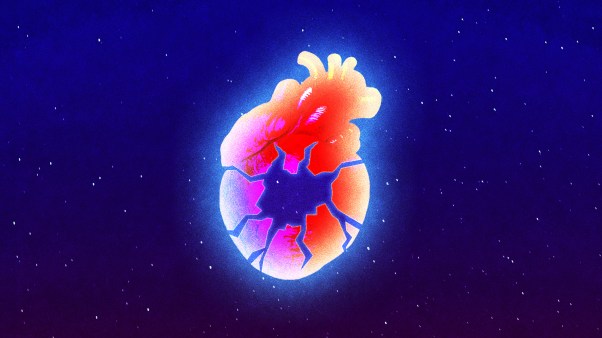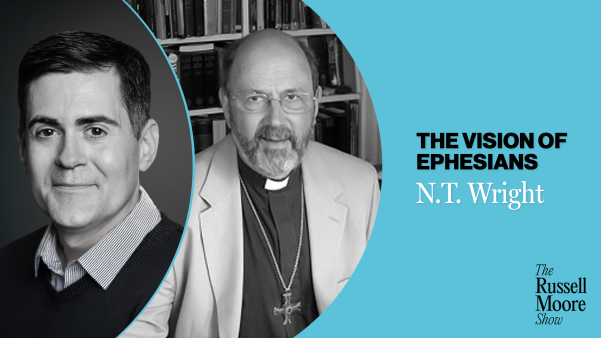
A couple years ago, I visited Israel with a group of Christian journalists. We bobbed in the Dead Sea, ate "Peter fish" in Galilee, and ascended the desert fortress of Masada. We toured the Church of the Holy Sepulcher, prayed at the Western Wall, and sat amid Gethsemane's twisted olive trees. But for me the highlight of the trip wasn't a place. It was a person—our guide, Amir.
Amir was in his late 50s, stocky, with skin that looked like leather from leading trips through the Holy Land for three decades. At each site, Amir would seek out an isolated spot, gather us in a semicircle, and expound upon the historical and theological significance of the site. Sometimes he seemed more like a preacher than a tour guide.
I remember one talk in particular. With the Mount of Olives shimmering in the background, Amir described what he saw as the basic problem of the universe. "God longs to come down to earth to redeem the righteous and judge the wicked," he said. "But there's a problem."
He leaned toward us and stretched out his arms like a scarecrow.
"His presence is like plutonium. Nothing can live when God comes near. If God came to earth, both the righteous and unrighteous would perish. We would all die!"
Initially Amir's metaphor struck me as strange. I'd heard God described as father, master, king, warrior, judge . . . but plutonium? Yet as I recounted God's interactions with the ancient Israelites, I wondered if Amir was onto something.
A Consuming Fire
We evangelicals love talking about God's love. Just drop in on one of our church services and listen. You'll hear worship choruses dripping with lyrics that border on romantic. The sermon will gush with assurances of God's affection. While such affirmations are good—we need reminders of God's love—rarely do we speak of God's majesty, let alone whisper a word about his wrath. Among young Christians, this one-sided view of God is especially striking. Jesus is a homeboy or boyfriend. God is the big guy upstairs. Talk of divine holiness is dismissed as legalistic or judgmental.
The Bible, however, describes God in sobering terms. Among the myriad titles given, he is called "a consuming fire," "Judge of all the earth," and the "Lord of hosts"—a title that portrays God poised for battle, at the head of a heavenly army. In addition, the Bible stresses God's discontinuity with humankind. "God is not human that he should . . ." is almost a refrain in Scripture. We might imagine that God is a sort of Superman, just like you or me but with additional powers. But that kind of thinking betrays a dangerous illusion. God is radically different from us, in degree and kind. He is ontologically dissimilar, wholly other, dangerous, alien, holy, wild.
When God shows up in Scripture, people cower and tremble. They go mute. The ones who manage speech fall into despair. Fainters abound. Take the prophet Daniel. He could stare down lions, but when the heavens opened, he swooned. Ezekiel, too, was overwhelmed by his vision of God. After witnessing Yahweh's throne chariot lift into the air with the sound of a jet engine, he fell face-first to the ground. When Solomon dedicated the temple, the glory of the Lord was so overpowering, "the priests could not perform their service" (1 Kings 8:11).
New Testament types fared no better. John's revelations left him lying on the ground "as though dead" (Rev. 1:17). The disciples dropped when they saw Jesus transfigured. Even the intrepid Saul marching to Damascus collapsed before the blazing brilliance of the resurrected Christ.
I understand why such accounts are jarring for us. They stand in stark contrast from popular depictions. In movies, angels are like teddy bears with wings. God is Morgan Freeman or some other avuncular figure. In Scripture, however, divine encounters are terrifying, leaving even the most stout and spiritual vibrating with fear—or lying face-down, unconscious.
Perhaps the story that best illustrates God's formidable holiness is found in Isaiah 6. In most Bibles the passage is titled "Isaiah's Commission." This is a classic example of burying the lead. Yes, these verses record Isaiah's prophetic calling, but first we see one of the most harrowing images of God in all of literature.
In the year that King Uzziah died, I saw the Lord, high and exalted, seated on a throne; and the train of his robe filled the temple. Above him were seraphim, each with six wings: With two wings they covered their faces, with two they covered their feet, and with two they were flying. And they were calling to one another:
"Holy, holy, holy is the Lord Almighty;
the whole earth is full of his glory."
The seraphim alone would make most mortals tremble. Their name, seraphim, literally means "fiery, burning ones." Their cries shake the temple. Isaiah shakes too.
"Woe to me! I am ruined! For I am a man of unclean lips, and I live among a people of unclean lips, and my eyes have seen the King, the Lord Almighty. (v. 5)"
The seraphim do little to assuage Isaiah's fears. It is not safe for him, a sinful mortal, to behold the unmediated glory of God. Death or cleansing—these are the only answers for Isaiah's predicament. Fortunately for Isaiah, the seraphim chose the latter.
Around the time I was meditating on Isaiah's vision, I attended a worship service where the pastor invited congregants to call out God's attributes by finishing this sentence: "Lord, you are . . ."
The responses came in rapid succession: "Loving!" said someone. "Merciful," added another. "Gracious." . . . "Kind." . . . "Compassionate." . . .
All true. Yet what I found interesting was what wasn't said. There wasn't a word about God's holiness, justice, or glory. Had Isaiah been in attendance, perhaps he would have added, "Terrifying."
Of course it's natural to ask, if portrayals of God holiness are unpopular why celebrate them? It isn't likely that the "terrifying holiness of God" tops the list of felt needs for our unbelieving neighbors. So why bother? Why not be content to focus exclusively on God's love?
While sidelining holiness may seem innocent, nothing could be further from the truth. A healthy appreciation for divine holiness has a tremendous impact on how we live and how we relate to God.
Holey Holiness
After Isaiah's vision, the prophet realizes he has a problem. There's a dangerous gulf between God and him. It's not merely about God's power and grandeur. Isaiah fears he's doomed because he has "unclean lips" (v. 5). It seems that a revelation of God is accompanied by an overpowering sense of God's purity and a corresponding awareness of human sinfulness.
While this concern for personal holiness is clear in Scripture, it has become murky in the church. Pastor Kevin DeYoung argues that we have a "hole in our holiness." He's not just talking about immorality per se; rather, "the hole in our holiness is that we don't really care about it."
One nationwide study from Barna Group found that "the concept of holiness baffles most Americans." When asked to describe what it means to be holy, the most common reply was "I don't know." Of those identified as "born again," only 46 percent believed "God has called them to holiness." The study concluded, "The results portray a body of Christians who attend church and read the Bible, but do not understand the concept or significance of holiness, do not personally desire to be holy, and therefore do little, if anything to pursue it."
Younger Christians in particular seem to view holiness as optional at best. Twenty-something writer Tyler Braun had this to say about his generation:
As the next generation of young Christians (including myself) continues to root themselves well within culture, we've lost the marks that allow Christ to be seen by a world that denies Him. We've lost holiness. Young believers have pursued life experience at the expense of innocence as we've given up on caring about the sin in our own lives.
Why is there such a lack of discernible holiness? Why this confusion on a basic Christian teaching? For Braun, the problem traces back to a lopsided understanding of God. "We picture God only as a God who provides mercy, not judgment. So of course we can get away with our sin, because God forgives."
I believe he's right. And not just about the younger generation. This thinking pervades the church—and we shouldn't be surprised. We lack a practice of personal holiness because we've lost a theology of divine holiness. When we neglect a part of God's nature, we shouldn't be surprised when that same attribute goes missing in our lives.
The Bible repeatedly makes the connection between God's holiness and ours. "Be holy," God says, "because I am holy" (Lev. 19:2). "Just as he who called you is holy, so be holy in all you do" (1 Pet. 1:15). We will never be perfect. Not on this side of eternity. But when we gain a fuller vision of God, our lives will begin to reflect his holiness.
Awesome Again
We go to great lengths to create atmospheres conducive to meaningful worship. Each year we publish reams of books on worship, hold worship conferences, and spend millions of dollars on instruments and décor we hope will lead people into the presence of God. None of this is wrong. Atmosphere is important. But no matter how much we invest, without an appreciation of God's holiness, our worship is fated to be superficial and, at best, momentarily moving.
But when we glimpse God's holiness, we begin approaching God with "reverence and awe" because we see him as "a consuming fire" (Heb. 12:28). "Ultimately transcendence is what makes a worship service meaningful," writes pastor Bill Giovannetti. When God shows up, worship doesn't have to be manufactured or drummed up. Worship is the natural reflex of mortals to the presence of a holy God. As Matt Redman puts it, "Worship thrives on wonder. For worship to be worship, it must contain something of the otherness of God." A vision of God's holiness rescues our worship from superficiality and makes it passionate and profound.
Note how Isaiah responds to his vision of God. At first he is distraught. But the passage doesn't end in despair. After the majestic appearance, the Lord asks, "Whom shall I send? And who will go for us?" (v. 8). At this point Isaiah's dismay becomes determination. "Here am I," he says. "Send me!" (v. 8).
Other stories of divine visitations follow a similar pattern. Initially the visited person is terrified, but fear gives way to obedience.
Today, it's no different. When I think of services in which I have sensed God's presence, it wasn't because the music was particularly good or the sermon especially profound. It was because there was a collective sense of God's holiness. I recall standing in a room with 300 people singing "How Great Is Our God" and feeling like we were blending into heaven. Only an intense appreciation for God's holiness produces such moments. Only when we marvel at his majesty will we achieve the deep intimacy that grows out of a true appreciation for who God is.
The cruel irony of choosing God's love over his holiness is that we end up losing both. The affection of a familiar, buddy deity isn't worth much. Only the love of the Lord of heaven and earth, who dwells in unapproachable light, is truly awe-inspiring. When we lose sight of God's greatness, his love loses meaning. Perhaps this is why we write more saccharine love songs about God's affection or make bizarre speculations that Jesus would have died "just for me." Are we trying to convince ourselves, through repetition and superlatives, that his love still has meaning?
Only when we rediscover the holiness of God will we be overwhelmed by his love. Only then will we realize how truly good the news of the gospel is—that this holy God turns out to be a lover, that the temple curtain designed to protect us is now torn to let us in. But let's never forget that he is the God of Isaiah 6. His throne is still exalted. The seraphim still cry holy. And so must we.
Drew Dyck is the managing editor of Leadership Journal and author of Yawning at Tigers: You Can't Tame God, So Stop Trying (Nelson Books, 2014), from which this article has been adapted.












